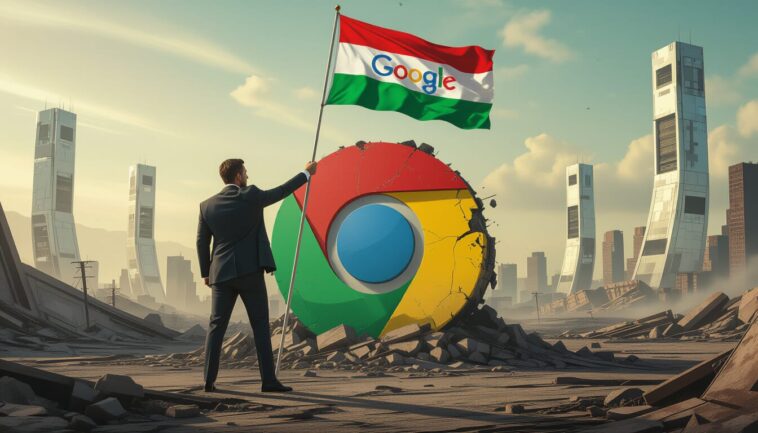Recently, Google announced with considerable fanfare that it had successfully defended its right to maintain control of the Chrome browser against Department of Justice (DOJ) antitrust proceedings. The victory was hailed by tech journalists as a triumph of innovation over regulation, a vindication of Google’s stewardship of the internet’s primary gateway, and a blow against the US government’s overreach into Silicon Valley’s natural order.
What these reports failed to mention—perhaps because the implications were too uncomfortable to acknowledge—was that Google had just won an expensive legal battle for the right to captain a sinking ship.
The timing could not have been more exquisitely ironic. As Google’s legal team celebrated their courtroom victory with champagne and press releases, their own AI division was quietly perfecting the very technology that would make web browsers as relevant as dial-up modems. The company had spent millions defending Chrome’s market dominance precisely at the moment when market dominance in browsers was becoming as valuable as a controlling stake in the telegraph industry.
The Obsolescence Engine
The Department of Justice’s case against Google’s browser monopoly represented the kind of regulatory thinking that arrives fashionably late to every technological revolution. While government lawyers argued over market share percentages and competitor access, the fundamental assumption underlying their entire case—that browsers would continue to be the primary interface through which humans access digital information—was quietly dissolving.
Consider the browsing habits of the average internet user in 2025. When was the last time you typed a URL into an address bar? When did you last bookmark a website? How often do you open multiple tabs to compare information from different sources? These behaviors, once essential to internet navigation, have become as antiquated as consulting a physical phone book or using a paper map.
The modern internet experience increasingly bypasses browsers entirely. Users ask ChatGPT for restaurant recommendations rather than visiting review websites. They query Claude for technical documentation instead of navigating to Stack Overflow. They request travel itineraries from AI assistants rather than browsing booking sites. The browser, that faithful intermediary between human curiosity and digital knowledge, has become a redundant middleman in an economy that increasingly values direct answers over exploratory discovery.
The Ministry of Browser Truth
Google’s legal victory was announced with the kind of corporate doublespeak that would make Orwell’s Ministry of Truth proud. The company’s press release proclaimed their commitment to “maintaining user choice” and “fostering innovation in web technologies”—phrases that sound meaningful until you realize they describe a commitment to preserving user choice in selecting their preferred deck chair arrangement on the sinking Titanic.
Chief Legal Officer Kent Walker explained the victory in terms that revealed more than they concealed: “This decision validates our position that Chrome serves users best when it remains integrated with Google’s ecosystem of services. The court recognized that breaking up this integration would harm innovation and user experience.”
Translation: Google successfully argued for the right to maintain control over a distribution channel that users are increasingly abandoning in favor of conversational interfaces that bypass the web entirely.
The cognitive dissonance is remarkable. Google’s own search traffic data shows declining direct website visits as users increasingly rely on AI-generated summaries and responses. Their own AI products are training users to expect immediate, synthesized answers rather than links to explore. Yet their legal and public relations departments continue to speak as if the browser wars of 2010 are still being fought.
The Final Tab
The evidence of browsers’ declining relevance is everywhere, hiding in plain sight like the obviousness of a lie told with sufficient confidence. Website traffic analytics show a steady migration from direct visits to AI-mediated interactions. User behavior studies reveal that people spend more time asking questions to AI assistants than typing queries into search engines. Mobile usage patterns demonstrate a clear preference for app-based interactions and voice commands over traditional web browsing.
Yet the technology industry continues to invest in browser development as if these trends are temporary aberrations rather than permanent shifts. Google continues to release Chrome updates with the dedication of watchmakers in the age of smartphones. Mozilla continues to position Firefox as a privacy-focused alternative as if privacy in web browsing will matter when web browsing itself becomes obsolete. Microsoft continues to promote Edge with the enthusiasm of telegraph operators promoting morse code efficiency improvements.
The technical infrastructure tells the real story. Google’s own server logs show that an increasing percentage of information requests are being fulfilled through API calls to AI models rather than HTTP requests to traditional websites. The company’s cloud computing division reports that their fastest-growing service category is conversational AI integration, not web hosting or content delivery networks.
The Agentic AI Uprising
The final nail in the browser’s coffin is not being hammered by competing browsers or regulatory action, but by agentic AI systems that treat the entire internet as a searchable database rather than a collection of discrete destinations requiring navigation.
These AI agents don’t browse websites; they consume websites. They don’t bookmark pages; they internalize information. They don’t compare multiple sources; they synthesize multiple sources into coherent responses. The browsing experience—that meandering journey through hyperlinks and search results—becomes an inefficiency to be optimized away rather than an experience to be enhanced.
Early adopters of agentic AI systems report a peculiar phenomenon: after weeks of interacting with AI assistants for information gathering, returning to traditional web browsing feels as cumbersome as navigating with a paper atlas after years of using GPS. The multiple-tab workflow, the bookmarking system, the careful navigation through website hierarchies—all of it feels like digital archaeology from a less efficient era.
The Chrome Extension Paradox
Perhaps nothing illustrates the absurdity of Google’s legal victory more clearly than the current state of Chrome extensions. The browser that Google fought to preserve is increasingly used not for browsing the web, but for hosting AI-powered tools that make web browsing unnecessary.
The most popular Chrome extensions in 2025 are AI writing assistants, automated research tools, and conversational interfaces that overlay traditional websites with intelligent interaction layers. Users install browser extensions to avoid using browsers. They preserve Chrome in order to transform it into something that is not Chrome.
This represents a peculiar form of technological evolution: the host becomes a platform for its own replacement. Google defended Chrome’s right to exist at precisely the moment when Chrome’s primary function was becoming the hosting of technologies that eliminate the need for traditional browser functionality.
The Last Website
Web developers report a curious phenomenon in their analytics: declining direct traffic, increasing API usage, and growing irrelevance of traditional SEO optimization. Websites are being accessed less by human visitors and more by AI systems that extract information without generating traditional page views or user engagement metrics.
The economic implications are staggering. The entire digital advertising industry—Google’s primary revenue source—is built on the assumption that humans will continue to visit websites where advertisements can be displayed. As information consumption shifts to conversational interfaces, the foundational business model of the modern internet begins to crumble.
Yet Google’s legal team celebrated their victory in preserving Chrome as if they had won the right to maintain ownership of the last surviving newspaper printing press in a world that has moved entirely to digital media.
The Monopolist’s Dilemma
The true irony of Google’s antitrust victory lies not in the regulatory implications, but in the competitive irrelevance. The Department of Justice worried about Google’s monopolistic control over web browsing at exactly the moment when web browsing was becoming a legacy technology maintained primarily for institutional compatibility rather than user preference.
Google won the right to maintain their monopoly over a market that is rapidly ceasing to exist. They successfully defended their control over the primary gateway to the internet just as the internet itself was transforming into something that doesn’t require gateways.
The competitive landscape of 2030 will not be determined by browser market share or search engine algorithms, but by the quality and accessibility of conversational AI interfaces. The companies that win the next phase of digital interaction will be those that best understand how humans prefer to access information: through natural language conversations rather than navigational clicking.
The End of Navigation
By 2030, asking someone which browser they use will sound as antiquated as asking which phone book they prefer. The question assumes a model of information access that belongs to the previous technological epoch. The browser wars ended not with a victor, but with the realization that the battlefield itself had become irrelevant.
Google’s legal victory in preserving Chrome represents the last great battle of the old internet. They fought magnificently for the right to control a technology that their own innovations were rendering obsolete. They won a monopoly that will matter to no one.
The future belongs to conversational computing, where information flows through natural language rather than hyperlinks, where answers arrive through intelligence rather than navigation, and where the concept of “browsing” the web sounds as archaic as “dialing” a phone number.
Google won the browser wars just as the browsers lost the war against the future.
Do you still open Chrome daily, or have you already shifted to asking AI assistants for most of your information needs? Is Google’s legal victory over Chrome the tech equivalent of winning a battle for the world’s best fax machine factory? Will the browser market of 2030 look more like the print newspaper industry of today—technically still existing but serving an increasingly niche audience? And most importantly: are we witnessing the end of the “browsing” era of internet usage, or will traditional web navigation find a way to remain relevant alongside conversational AI?
Share your thoughts on whether Google just won the most expensive participation trophy in tech history, or if browsers will somehow survive the age of agentic AI.





GIPHY App Key not set. Please check settings